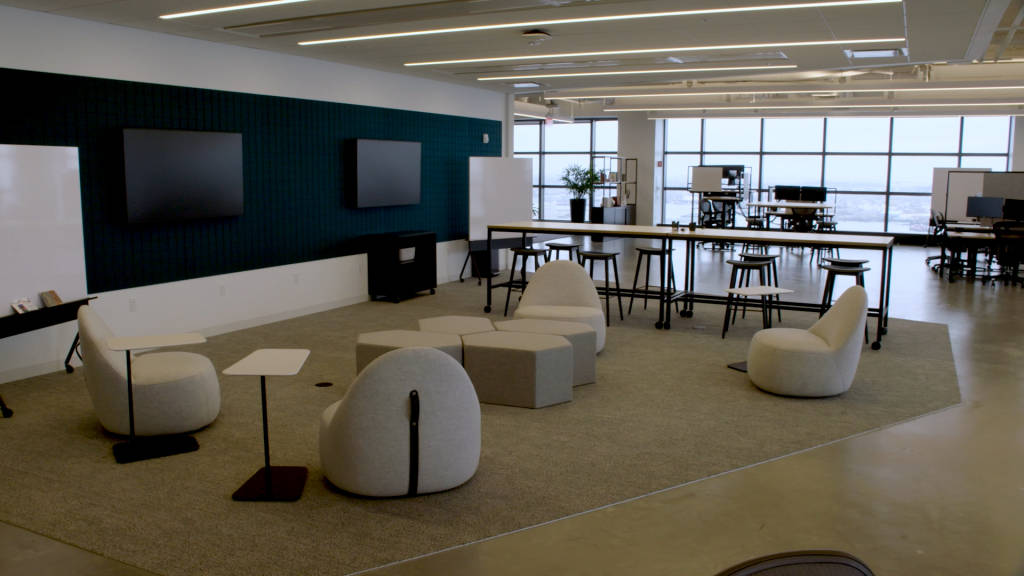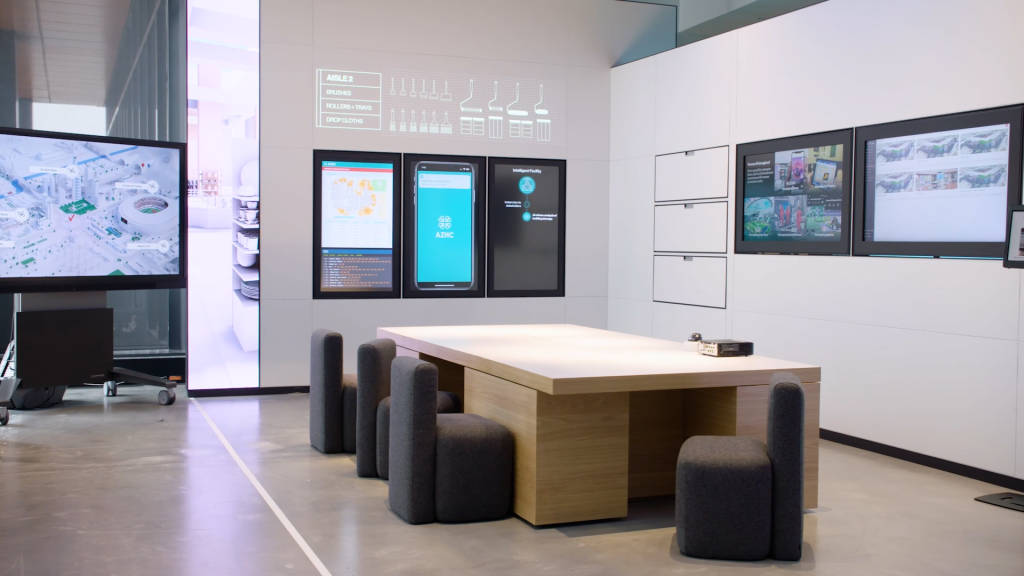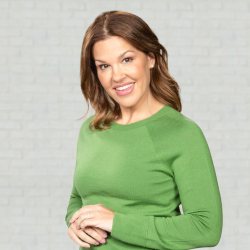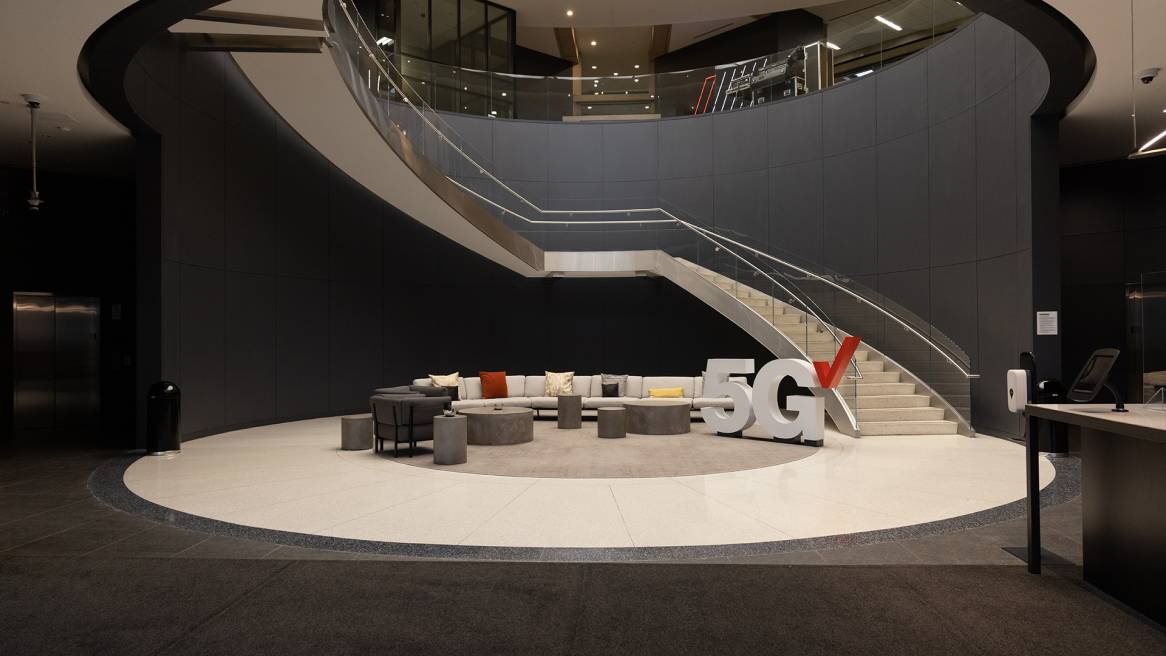How Verizon is Reshaping the Employee Experience
Global Telecom Giant Focuses on Choice + Culture to Reshape Office of Tomorrow
New York-based Verizon is one of the largest telecommunications corporations in the world, with 120,000 global employees. Steelcase Vice President of Insights Dr. Tracy Brower recently sat down with Verizon HR and Diversity leader Christina Schelling to understand how one of the world’s largest employers approaches shifting work experiences.
Tracy Brower: As you think about the work experience, in what way have your perspectives shifted over the last couple of years?
Christina Schelling: The shift to hybrid work was dramatic but very positive. As a behaviorist who loves to study connections between people, it’s been really interesting to watch the shift in the work experience across companies and the positioning of that experience. Historically, companies thought about the employee experience as beginning when someone stepped into an office and it ended the moment they stepped out to go home.
At Verizon, we want to provide a broader, more holistic employee experience – one that is meaningful and fulfilling, both professionally and personally. With a deeper connection to individual purpose, individual drivers and the employee’s “why” for being, we are creating a work experience that’s differentiating in the best way possible.
TB: How have your employees’ expectations changed recently?
CS: It’s been an ongoing evolution, but the pandemic, global social crises, civil rights challenges in the U.S., international war and everything that’s happened over the past few years have raised the bar on what employees expect from employers. There is an expectation now that your work experience will be “human first.” Which means companies must put the spotlight on the things that make us human – like mental, emotional, and physical health, time management and more. It’s our job, as employers, to provide the experience that helps create balance across those things.
Obviously, providing challenging and fulfilling work opportunities, a competitive salary and benefits are still table stakes. But it’s how we provide those things that makes the difference. How do we offer something for everybody that is unique and individual but is scalable for the business? To me, it’s about choices in benefits. We need to empower employees to take advantage of what makes sense to them and provide options that meet employees where they are in life. As a total rewards provider, a career provider, and an experience provider, it’s about giving them the flexibility to choose how, when or where they work and more.

TB: What are the key business drivers you’re addressing today?
CS: We talked about the accelerated change in employee expectations. Related to this is the expectations of our customer for us to offer exceptional experience and to deliver at the pace of change and innovation.
All of that is hard. Really hard. The expectations and qualifications of a leader have changed significantly as well, and current and future leaders must be ready to deliver more than ever. We’ve always had to be a coach and good at managing, delegating, and making decisions. We’ve always been expected to give constructive feedback and developmental actions for improvement. But now, in addition to those traits, we also need to be more creative, communicative, relatable, vulnerable, down to earth, and empathetic. Leaders need to lead across boundaries in the physical and virtual space.
For a long time, there was this idea that leaders were “suits,” who showed up strong and flawless, inspirational and exact. But all of that has changed. The future of good leadership is about delivering results in a way that is open, transparent, and truthful about failure. It’s about rebounding and showing resilience.

TB: You mentioned things are hard for those who care for employees as well, including HR. How do you view the future of HR?
CS: I believe HR is a critical steward, facilitator, and producer of culture. When I think about everything needed to win in the market – innovation, differentiated customer experience, courage and resilience – we need to make sure our practices and processes are driving, rewarding, role modeling and motivating that culture.
The truth is that what got us here is not going to continue to keep us here. And it’s certainly not going to get us where we need to go. So, it’s crucial that we modernize and evolve our systems.
Our future of work is called ‘Work Forward.’ We are, like everybody else, testing and learning programs and processes around how we connect, create community, and bring together our employees across boundaries in a remote setting, in-person or in a hybrid version. The variety we have in how and where we work is fantastic. But it’s important that we double down and try different things to really sustain and accelerate our culture, community, and connection.
I also think the qualifications and expectations of HR professionals have evolved, too. Five or 10 years ago, when you would review a resume and highlight the most important experiences and capabilities required of an HR professional, DEI, employee experience and the understanding of wellness and wellbeing, probably didn’t rise to the top of that qualification list. Now, those things are the top three or four.
TB: You mentioned your ‘Work Forward’ approach and hybrid work. As you think about place, and the office, how do you see those HR issues connected with a physical experience together?
CS: A couple years ago, a senior leader said to me, “Employee concerns have probably gone away, right? Because no one’s in the office?” While I have noticed some ups and downs in instances of challenges employees face, I think it’s more about the “human piece,” than the “place piece.”
Another angle to this (and I’ve been thinking about this for myself a lot) is around wellbeing and self-care.
The mental and emotional fatigue that comes with learning or adjusting to a new schedule and new balance is challenging. I probably go into the office two or three times a week and have a significant commute. But the pros far outweigh the cons. I get so much joy and energy from the days I’m in the office, and I know I’m not alone when I say that there’s something very uplifting about being close to other human beings. Having that variety is good for people and their wellbeing. There are productivity measures that prove it. And, from the human perspective, it’s good to have variety, closeness, and physical connectedness. So we ensure that the times we are together in the office are times where we prioritize collaboration and connecting in high value ways.
Our mantra: Be a magnet, not a mandate.
TB: How is the office serving employees’ needs today – in terms of the kind of work they’re doing in the office?
CS: I love that question, and I see both collaboration and focus work being done at the office. At Verizon, our strategy has been to deliver for our customers through the importance of the people who work for us. Listening and being tuned into the needs and the best setup for productivity and success, both professionally and personally, is how we have steered our strategy from the beginning.
We’ve iterated a bit and we’ve learned a lot, but we also know we aren’t a culture that mandates fixed schedules as an overarching rule. There are types of jobs where it makes sense to have a fixed schedule and the role requires that. We have lots of amazing V Teamers in stores and out in the field serving our customers every day. We also have jobs where it should be a lot more fluid for the person and for the work they do. So we look at job requirements, and what the best workstyle setup for success would be for those jobs and those people.
Our Work Forward program and the future of work considerations in many companies are really good for diversity and inclusion, too. There are lots of pieces we still need to get better at, but the idea that it’s not one-size-fits all – the hours you work, the place you work, the setting in which you work – it means that people have flexibility to support themselves as individuals.
When we’re in the office, our leaders and our employees are encouraged and challenged to create moments that matter together. Those are the times we spend together. The moments that matter could be volunteering together, learning something new, collaborating or attending an important meeting.
The real advantage here is for purpose, meaning, and being really thoughtful to match the best way to work, for the type of work to deliver the most brilliant outcomes and impact.

Christina Schelling is a highly influential HR and talent management expert with more than 20 years of experience in progressively responsible, cross-functional, global leadership positions. She is also incredibly passionate about helping businesses and employees reach their full potential by harnessing the power of their differences. Currently, Christina oversees all aspects of Verizon’s talent practices including hiring, learning, career development, succession planning, DEI and more for over 120,000 employees globally.


